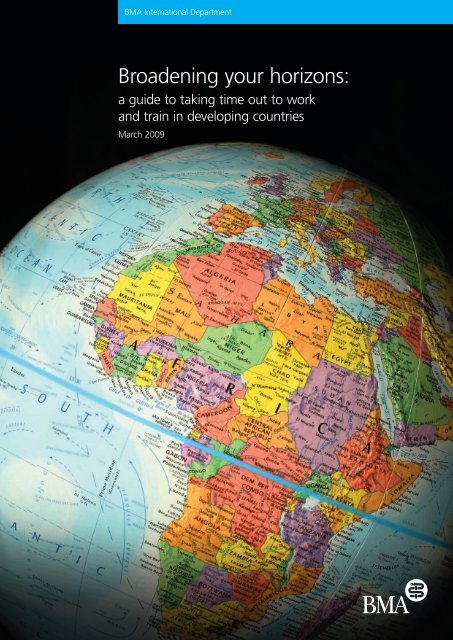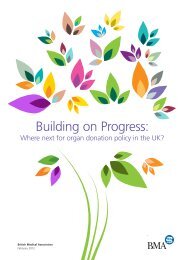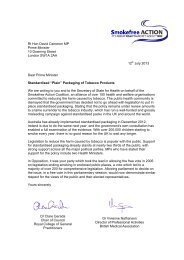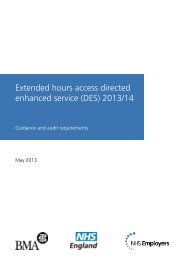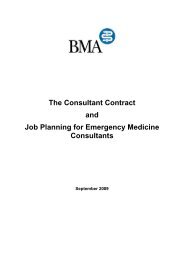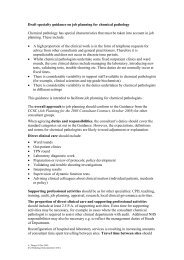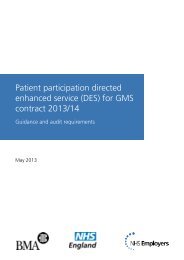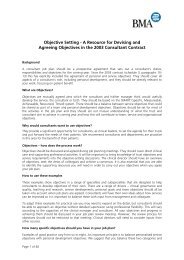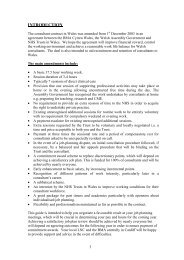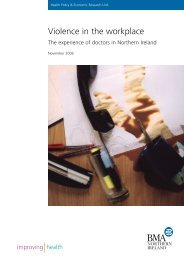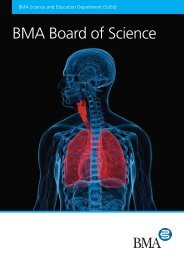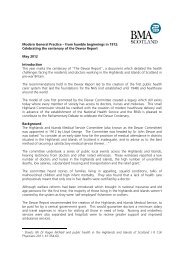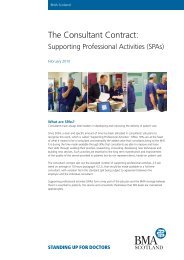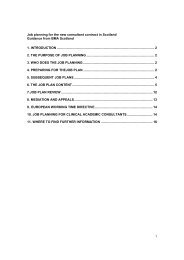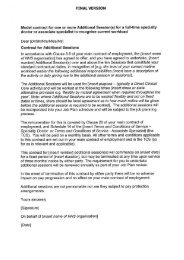Broadening your horizons - BMA
Broadening your horizons - BMA
Broadening your horizons - BMA
Create successful ePaper yourself
Turn your PDF publications into a flip-book with our unique Google optimized e-Paper software.
<strong>BMA</strong> International Department<br />
<strong>Broadening</strong> <strong>your</strong> <strong>horizons</strong>:<br />
a guide to taking time out to work<br />
and train in developing countries<br />
March 2009
<strong>BMA</strong> International Department<br />
Contents<br />
General principles ..............................................................................................................................3<br />
How to apply: step-by-step process ................................................................................................5<br />
Taking time out of training...............................................................................................................6<br />
A. Process for taking time out of training .......................................................................................6<br />
B. Taking time out of programme (OOP).........................................................................................7<br />
C. Process for PMETB approval........................................................................................................8<br />
D. Criteria for OOPEs in developing countries.................................................................................9<br />
E. Point in training to take time out................................................................................................9<br />
Taking time out of employment ....................................................................................................11<br />
Employment policies: NHS Career Break Scheme................................................................................11<br />
Application process .............................................................................................................................13<br />
Alternative mechanisms ......................................................................................................................13<br />
Appraisals............................................................................................................................................14<br />
Applying to take time out of the NHS: template application letters........................................15<br />
Template application letter: trainees....................................................................................................16<br />
Template application letter: employees ...............................................................................................18<br />
Notice periods...................................................................................................................................20<br />
Overview .............................................................................................................................................20<br />
Recommended timescales...................................................................................................................20<br />
Deferral of training..........................................................................................................................21<br />
Providing information to applicants..............................................................................................22<br />
Appeals process................................................................................................................................23<br />
Keeping in touch..............................................................................................................................25<br />
Out of programme..............................................................................................................................25<br />
Out of employment ............................................................................................................................25<br />
Recording experiences: trainees.....................................................................................................26<br />
Reporting back to colleagues .........................................................................................................27<br />
Pensions ............................................................................................................................................27<br />
GMC registration: advice for doctors taking time out ................................................................28<br />
Revalidation......................................................................................................................................30<br />
Returning from time out of employment.....................................................................................31<br />
Appendix 1: Further information and advice...............................................................................33<br />
Appendix 2: Contact information ..................................................................................................38<br />
<strong>Broadening</strong> <strong>your</strong> <strong>horizons</strong>: a guide to taking time out to work and train in developing countries 1
2<br />
<strong>BMA</strong> International Department<br />
Appendix 3: Approvals pathway for time out of programme (OOP) .......................................41<br />
References.........................................................................................................................................42<br />
This guidance document is based on national policies where applicable and has been<br />
checked for accuracy by relevant medical education and employment authorities and<br />
external bodies.<br />
This document is intended for information purposes only and is not intended to<br />
supersede any statutory conditions of service or training agreements.<br />
<strong>Broadening</strong> <strong>your</strong> <strong>horizons</strong>: a guide to taking time out to work and train in developing countries
<strong>BMA</strong> International Department<br />
1. General principles<br />
Working in developing countries has been a treasured opportunity for doctors at all stages of their<br />
careers. With an increasingly diverse patient population in the UK, an ever more integrated global<br />
healthcare system, and unprecedented access to people and places around the world, it is more<br />
important than ever before that UK doctors are able to access opportunities to gain international<br />
experiences for the good of patients and healthcare systems at home and abroad, as well as for their<br />
own professional and personal development.<br />
Benefits to developing countries<br />
UK doctors who work in developing countries can make significant contributions to health systems<br />
and the wider society both globally and nationally. The UK has a long history of international<br />
healthcare initiatives, with doctors contributing their knowledge to other healthcare systems and<br />
learning from them. It is essential that UK doctors continue to be given the opportunity to work<br />
in developing countries in order to continue the UK’s commitment and support.<br />
Benefit to the NHS and its patients<br />
The UK patient population is ethnically diverse and the NHS benefits from staff with cross-cultural<br />
experience and awareness. Doctors at any level, from trainees to senior clinicians, working in<br />
developing countries can enhance their own experiences from the UK and enable them to develop<br />
clinical skills in a different setting. They become better equipped to cope with the changing face of the<br />
NHS and the diverse disease burden within the UK.<br />
Benefit to the individual doctor<br />
For trainees, gaining experience in developing countries can provide an opportunity to develop their<br />
ability to allocate resources, plan and monitor initiatives, cope with change, work in multidisciplinary<br />
teams and provide leadership. It can also enable learning about interactions between primary and<br />
secondary care and management of organisations. These skills are increasingly important for doctors<br />
in the modern NHS. It can also help them to identify career paths for the rest of their professional lives.<br />
For doctors who have completed their training, the experience of working internationally can be<br />
invaluable to their continuing personal and professional development. UK doctors often choose to<br />
spend time in developing countries to share their skills and experiences with colleagues who work<br />
in health systems with low staff levels, limited equipment and medicines, and other pressures. These<br />
doctors can contribute to the education and training of their developing country colleagues as well<br />
as refining their own teaching skills. Further to this, and of great benefit to the staff and patients<br />
within the NHS, doctors return to the UK reinvigorated and refreshed, bringing both new ideas and<br />
new energy to their careers and feeling that they have made a significant contribution to the global<br />
health community.<br />
Reports and policy<br />
In recent years several UK Government reports have recognised these benefits and highlighted the<br />
importance to UK doctors of international experiences. The Tooke report recommended that health<br />
professionals should be allowed to interrupt their training to gain experience that enhances their<br />
career and the contribution they make to the NHS, 1<br />
and the Crisp report recommended that ’an NHS<br />
framework for international development should explicitly recognise the value of overseas experience<br />
and training for UK health workers and encourage educators, employers and regulators to make it<br />
easier to gain this experience and training… PMETB should work with the Department of Health, royal<br />
colleges, medical schools and others to facilitate overseas training and work experience’. 2<br />
The UK<br />
Government’s responses to these reports have echoed the importance of doctors taking time out to<br />
work in developing countries, and included specific commitments to support and facilitate these<br />
experiences. 3,4<br />
<strong>Broadening</strong> <strong>your</strong> <strong>horizons</strong>: a guide to taking time out to work and train in developing countries 3
4<br />
<strong>BMA</strong> International Department<br />
<strong>BMA</strong> ‘<strong>Broadening</strong> <strong>your</strong> <strong>horizons</strong>’ guidance<br />
This guidance has been developed in response to requests from <strong>BMA</strong> members throughout the NHS<br />
who have faced problems or have concerns about taking time out to work in developing countries.<br />
Recent changes in postgraduate medical training, the Modernising Medical Careers system, and the<br />
role of the regulator PMETB, provide challenges and opportunities for training overseas. This can mean<br />
that doctors are increasingly insecure about their future and have concerns that taking time out of<br />
work in the UK may jeopardise their career. Many young doctors have the impression that time out to<br />
gain experience in developing countries is not an option while in training. Doctors also face pressures<br />
to meet workforce demands at the cost of their own professional career or personal goals.<br />
It is vital that those responsible for approving time out from employment and training for doctors<br />
recognise the value of experiences from developing countries for professional and personal<br />
development and provide advice and support to doctors considering applying to take time out.<br />
This guidance aims to support doctors at all stages in their careers, from trainees, staff grade and<br />
associate specialists, to consultants and general practitioners (GPs), in successfully taking time out from<br />
working as a doctor in the NHS to gaining professional experience in developing countries. It also aims<br />
to support deans and employers in the NHS to understand how best to support doctors as part of the<br />
wider workforce.<br />
The guidance gives a clear account of the application process and the responsibility of applicants,<br />
approvers and other key individuals, such as educational and professional mentors. It recommends best<br />
practice for both applicants and approvers to ensure that there is sufficient information exchanged and<br />
clear communication between all parties.<br />
The benefits of UK doctors working internationally are immeasurable; the costs are minimal. The <strong>BMA</strong><br />
hopes that this guidance helps doctors, deaneries and employers to continue to make working in<br />
developing countries an important part of a medical career in the NHS.<br />
<strong>Broadening</strong> <strong>your</strong> <strong>horizons</strong>: a guide to taking time out to work and train in developing countries
<strong>BMA</strong> International Department<br />
2. How to apply: step-by-step process<br />
The following sections aim to explain the process of applying, and getting approval, for time out for<br />
doctors in training and employment. This section also includes recommendations for doctors and<br />
approving authorities to consider before, during and after the application process. While every attempt<br />
has been made to cover all the issues that doctors and relevant authorities should consider, these<br />
recommendations may not be exhaustive and are only indicators of the information and support<br />
individuals should be aware of and receive.<br />
It is important that doctors consider the personal, professional and potential service impact of taking<br />
time out of employment and training. Doctors wanting to engage in global health challenges, for<br />
example, should consider time out in the context of their personal and professional aspirations, and<br />
make it an integral part of professional development plans. These plans should be discussed with<br />
existing mentors and professional supervisors as part of the regular appraisal or mentoring process,<br />
and the importance of such experiences to personal and professional goals highlighted. Such<br />
discussion, and planning, should take place as early as possible before the anticipated period of<br />
absence.<br />
Further information and advice may also be obtained from experienced colleagues. <strong>BMA</strong> members can<br />
also obtain information from the <strong>BMA</strong> website or by contacting the <strong>BMA</strong> directly.<br />
<strong>Broadening</strong> <strong>your</strong> <strong>horizons</strong>: a guide to taking time out to work and train in developing countries 5
6<br />
<strong>BMA</strong> International Department<br />
Time out of training<br />
A. Process for taking time out of training<br />
Specialty training is managed by the local postgraduate deanery and the relevant royal college or<br />
faculty and authorised by the Postgraduate Medical Education and Training Board (PMETB). Training<br />
programmes are subject to national guidelines set out by the Department of Health, in A reference<br />
guide for postgraduate specialty training in the UK (the ’Gold Guide’). 5<br />
The guidelines allow trainees to<br />
take time out of programme (OOP) for a number of reasons (see below) and must be approved by the<br />
local postgraduate dean, royal college, and PMETB where applicable.<br />
Before applying, trainees should be clear about their reasons for taking time out. Some OOP<br />
opportunities will deliver competencies recognised by PMETB, whereas others will contribute to an<br />
individual’s growth as a doctor (see Process for PMETB approval). Opportunities also exist for OOP for<br />
personal reasons. Any application should detail what will take place during the OOP, the personal and<br />
professional benefit to the individual trainee, and other relevant information such as what skills it will<br />
develop beyond those acquired on the training programme. It may be beneficial to discuss the aims of<br />
the proposed OOP with senior colleagues or the educational supervisor. Applicants may also wish to<br />
refer to the benefits to the NHS and fulfilment of UK global health commitments outlined in the UK<br />
Government responses to the Tooke and Crisp reports.<br />
It is important to note that deans are unlikely to approve OOP for those who are not progressing well<br />
in their training, unless time out is for health reasons. Those trainees who take a period of OOP retain<br />
their National Training Number (NTN), leaving gaps within the rotation. Deans may take into<br />
consideration the needs of the service and the impact on patient care and the training of colleagues<br />
when assessing OOP applications from trainee doctors.<br />
It is important that individual doctors discuss their intention to take time OOP with educational<br />
supervisors and deanery representatives at the earliest possible stage. Trainee doctors considering<br />
taking time OOP should ensure that there is sufficient time before the proposed break to discuss their<br />
plans and to complete and submit a considered and thorough OOP application to the deanery<br />
(refer to section on Notice periods).<br />
To gain the necessary permission for taking time out of the specialty training programme while<br />
retaining a NTN:<br />
– Trainees must complete the OOP application form used by their deanery (see section on Template<br />
application letters).<br />
This form must be countersigned by the educational supervisor before being submitted to the<br />
postgraduate dean for approval. Individual deaneries may require further documentation and<br />
evidence in addition to a completed OOP application form. It is important that applicants clarify<br />
the OOP policy and procedure of the approving deanery before submitting an application as<br />
practices vary. In some instances, the educational supervisor may need to provide a supporting<br />
statement or record of discussions with the trainee about the application. It is the responsibility of<br />
the trainee to ensure that full supporting documentation is sent to the deanery within the required<br />
timeframe. Once all the required information is received, the deanery will consider the application<br />
for approval.<br />
– Trainees should also contact the relevant royal college body with responsibility for postgraduate<br />
training, such as the Specialty Joint Committee (JRCPTB or JCST) and/or Specialty Advisory<br />
Committee (SAC).<br />
Details can be obtained from the educational department of the relevant medical royal college (see<br />
Appendix 2: Contact information). The deanery should be kept informed of all correspondence,<br />
and in some instances may liaise directly with the royal college.<br />
<strong>Broadening</strong> <strong>your</strong> <strong>horizons</strong>: a guide to taking time out to work and train in developing countries
<strong>BMA</strong> International Department<br />
– It is essential that, before taking time out of training, trainees have decided whether or not they<br />
wish the time spent out of programme to count towards their Certificate of Completion of Training<br />
(CCT), and ensure that they have discussed this with their educational supervisor.<br />
If the time out of programme is to count towards CCT, the deanery will submit the application to<br />
PMETB on the applicant’s behalf for their approval (see section on Process for PMETB approval).<br />
If the period of OOP does not require approval, then the medical royal college should also be<br />
informed in order to amend the trainee’s CCT date. Once the application has been approved, the<br />
educational supervisor and employer (current and/or next) need to be given notice of the proposed<br />
absence in writing as soon as possible. The process varies slightly between specialties but Approval<br />
of OOP periods diagram (page ref) outlines the approvals pathway.<br />
PMETB do not retrospectively approve training for the Certificate of Completion of Training (CCT)<br />
– Trainees should ensure that their educational supervisor is aware of the anticipated date of their<br />
return in order to secure their re-entry to the training programme.<br />
Where the duration of the OOP is longer than a year, the OOP document should be returned on<br />
an annual basis to the deanery while the trainee is out of programme, and at least six months’<br />
notice must be given of the intended return date. Applicants should note that training placements<br />
depend on availability and they may have to wait for a placement on their return.<br />
Applicants who wish to extend their OOP period will need permission from the deanery as if it were a<br />
new period of time out, and should inform the relevant medical royal college and PMETB, including<br />
requesting further approval where applicable.<br />
All parties should also be informed about any changes to the OOP, such as advising if the OOP is not<br />
going ahead, if the start dates, duration or location change, or if the trainee’s experiences during the<br />
placement differs from the original application. Failure to provide information to the relevant<br />
authorities could result in the loss of the trainee’s NTN.<br />
B. Taking time out of programme (OOP)<br />
There are a number of OOP options, which are detailed in the Gold Guide (section 6.69 onwards).<br />
The decision about which OOP to apply for, and eligibility for accreditation to CCT, must be clarified<br />
by applicants with their educational supervisor in advance of any application, and applicants should<br />
ensure sufficient time to discuss the various options. Trainees who do not require prospective PMETB<br />
approval must indicate this on the application form.<br />
Taking time out of programme to undertake research (OOPR)<br />
Trainees will need the prospective agreement of the postgraduate dean to take time out of<br />
programme to undertake research or an appropriate higher degree, and should provide details of the<br />
research proposal and name/location of the research supervisor on the relevant form. If the time out<br />
of programme is to count towards CCT, the application will require prospective approval by PMETB.<br />
Taking time out of programme for approved clinical training (OOPT)<br />
Trainees can undertake a period of training outside the training scheme which counts towards CCT,<br />
and will require prospective approval by PMETB. This will include, for example, undertaking an<br />
approved training post in a different training programme in the UK, but could also include overseas<br />
posts, which have prospective training approval. Information on alternative posts can be obtained from<br />
the relevant medical royal college.<br />
<strong>Broadening</strong> <strong>your</strong> <strong>horizons</strong>: a guide to taking time out to work and train in developing countries 7
8<br />
<strong>BMA</strong> International Department<br />
Trainees who undertake prospectively-approved overseas training will need to be able to provide<br />
evidence to demonstrate the relevant competencies were achieved. Evidence can include trainers’<br />
reports as well as any assessments that have been undertaken. Required evidence should be discussed<br />
with deaneries or employers before the period of time out (see section on Recording experiences:<br />
trainees). PMETB advise trainees to keep a record of experiences and to have written confirmation<br />
that the posts/placements are recognised as suitable for training experience from the host country’s<br />
recognised competent authority.<br />
Taking time out of programme for clinical experience (OOPE)<br />
Trainees may seek agreement for OOP time to undertake clinical experience which has not been<br />
approved by PMETB and which will not contribute to award of a CCT. The purpose of the time<br />
out could be to enhance clinical experience through experiencing different working practices or gain<br />
specific experience in an area of practice and/or support the relevant recommendations in Global<br />
health partnerships: the UK contribution to health in developing countries (2007).<br />
See next section on OOPEs for further information<br />
Time out of programme for career breaks (OOPC)<br />
A planned career break will permit a trainee to step out of the training programme for a designated<br />
and agreed period of time. As the period of OOPC does not contribute towards training,<br />
arrangements should be made to amend the trainee’s CCT date.<br />
C. Process for PMETB approval<br />
This section was checked for accuracy with PMETB representatives and was accurate at the<br />
time of publication<br />
As stated above, PMETB approval is only required if a period of OOP is to count towards the award of<br />
a CCT. If the time spent out of programme is not required to count towards the award of a CCT,<br />
such as when the trainee’s principle aim is to gain personal or professional experience by working in a<br />
different health environment or undertake international development work, then PMETB approval<br />
or involvement is not necessary (see below on OOPE/non-accredited time out of training).<br />
PMETB cannot accept applications from individual trainees or colleges/faculties and OOP<br />
application forms must be submitted to PMETB by the deanery only. There is no designated form<br />
from PMETB to be completed, but trainee OOP applications to the deanery must include the three<br />
areas outlined below.<br />
1. A formal covering letter from the deanery (the dean or their designated member of staff) to<br />
PMETB seeking prospective approval of the OOP placement and confirming that the placement<br />
has deanery support along with the following essential information: trainee’s full name; date of<br />
birth; GMC number; NTN number; specialty.<br />
2. Confirmation that the specialty, through appropriate college mechanisms, is aware of and<br />
supports the OOPT or OOPR placement. The specialty should also indicate the length of time the<br />
OOPT/OOPR should count towards the trainee’s CCT.<br />
3. A statement detailing the purpose and structure of the OOPT or OOPR placement, including<br />
confirmation that the placement is subject to quality management in line with PMETB<br />
requirements. Applicants should include appropriate evidence in their application to the deanery<br />
to demonstrate why the time out of training is appropriate and meets PMETB standards and<br />
requirements.<br />
<strong>Broadening</strong> <strong>your</strong> <strong>horizons</strong>: a guide to taking time out to work and train in developing countries
<strong>BMA</strong> International Department<br />
Applications for PMETB approval of the OOP placement should be sent by the deanery to<br />
quality.assurance@pmetb.org.uk PMETB will respond to the deanery and the applicant will be<br />
informed of the final decision. If a decision from the medical royal college has not been received<br />
before an OOP application is submitted to the deanery, applicants should indicate this and provide any<br />
related information.<br />
Further information on PMETB approval and accreditation of OOP can be found at www.pmetb.org.uk<br />
FAQs specific to approval of training are available on this website. 6<br />
CCT training in another European Union (EU) member state<br />
Prospective approval from PMETB is not required for training in another EU member state to count<br />
towards a CCT. PMETB recognises training approved by the competent authorities in other EU states.<br />
Providing the individual is transferring between posts that comply with European directive<br />
requirements and have written confirmation that the competent authorities approve those<br />
posts, this training can be recognised towards a CCT. This is applicable to non-EU nationals as well<br />
as EU nationals. PMETB do not need to receive any paperwork in this situation. 7<br />
NB This is not applicable to overseas posts where prospective approval must be granted.<br />
D. Criteria for OOPEs in developing countries<br />
It is strongly recommended that trainees identify the professional or personal goals of the proposed<br />
OOPE and ensure these are clearly expressed in the OOP application form or covering letter.<br />
For OOPE in developing countries, specific objectives may include:<br />
• enhancing the trainee’s clinical experience outside that provided by the training programme, such as<br />
higher patient loads, perform more procedures, or work more independently than usual<br />
• experience of practising cost-effective medicine in resource-poor settings<br />
• experience of working in a small medical centre<br />
• experience of setting up/developing a particular service<br />
• experience of leading or being part of leading a service<br />
• working in a mobile unit (eg cataract operations or flying doctors)<br />
• promotion of health and disease prevention (eg family planning, vaccinations, malaria prevention)<br />
• experience of working with medicines/procedures not used in NHS<br />
• experience of patient care for illnesses uncommon in the UK (eg malaria, TB)<br />
• experience of working with medicines/procedures not used in NHS<br />
• treating patients from different socio-economic or cultural backgrounds<br />
• experience that contributes to wider career goals, such as global health or development.<br />
For work in developing countries, prospective approval by PMETB is often not possible as the quality<br />
of training and supervision cannot be guaranteed. Many trainees view experiences from developing<br />
countries as additional to their UK training and not as substitutes. PMETB approval for OOPE may be<br />
awarded if the steps outlined above are successfully completed but applicants should be aware that<br />
this is not common. 8<br />
E. Point in training to take time out<br />
On average, trainees are expected to have undertaken at least a year of training prior to making a<br />
request for OOP. Each individual case will be considered on merit and all plans for taking time out of<br />
training, and its impact on the individual trainee’s progression, should be discussed with educational<br />
supervisors. It is recommended to seek advice from those familiar with <strong>your</strong> specialty, such as<br />
<strong>Broadening</strong> <strong>your</strong> <strong>horizons</strong>: a guide to taking time out to work and train in developing countries 9
10<br />
<strong>BMA</strong> International Department<br />
experienced colleagues or the royal college postgraduate clinical tutor, on the best time to take time<br />
out during training.<br />
A trainee who has completed the foundation programme, or finished core training, and is yet to apply<br />
for a further training post may wish to consider taking time out prior to applying for an ST1 or ST3.<br />
It is important to note that you would not be protected by a NTN and <strong>your</strong> continuation of service<br />
would be affected.<br />
Trainees who wish to take time out to work with a humanitarian or charitable organisation should<br />
note that most agencies require a minimum of two to three years’ postgraduate clinical experience<br />
and training prior to working with a humanitarian or charitable organisation. One option is to take<br />
time out after finishing foundation programme training.<br />
GP trainees<br />
The nature of funding of GP training programmes can make arrangements for OOPEs difficult as<br />
deaneries may find it problematic to split the three-year programme, or arrange an appropriate break<br />
point in the curriculum. Deaneries are still able to accommodate OOPEs, with timing most often<br />
between ST2 and ST3. There may be local variation and competing pressures on approvals due to<br />
capacity and post availability.<br />
One example of OOP for GP trainees is London Deanery schemes for six-month GP SHO placements in<br />
rural community hospitals in South Africa. 9<br />
Posts are available for time out of a training programme for<br />
clinical experience for one year (OOPE). London Deanery have also piloted a 12-month OOPT post<br />
(which has been running for two years), which is PMETB approved and counts as six months towards<br />
the award of a CCT.<br />
<strong>Broadening</strong> <strong>your</strong> <strong>horizons</strong>: a guide to taking time out to work and train in developing countries
<strong>BMA</strong> International Department<br />
Taking time out of employment<br />
This section was checked for accuracy with NHS Employers<br />
representatives and was accurate at the time of publication<br />
Health professionals working in the NHS have many different professional aims throughout their<br />
careers. Doctors may want to take time out of employment in the NHS with the reassurance that<br />
they can return to UK employment and continue involvement in their local service without having<br />
their career progression adversely affected. It is therefore important that policies are in place to enable<br />
flexibility in employment so employees can incorporate a period of absence into their careers. This is<br />
of benefit to UK employers due to the experiences gained by their employees spending time working<br />
in international health: additional knowledge may be gained that can transfer into the UK health<br />
system; links with health research centres overseas and ongoing collaborative relationships established;<br />
employees act as ’ambassadors‘ for their UK employer; and employee satisfaction is improved.<br />
An employee wishing to take time out of employment should contact their human resources<br />
department for information on the terms and conditions under which various options for taking a<br />
break from employment are offered. Potential applicants should also discuss their plans with their<br />
clinical manager. Identifying and contacting other health professionals who have also taken advantage<br />
of the opportunity to work overseas can be useful, and can help facilitate arrangements, highlight any<br />
potential problems, and suggest solutions. A proposed employment break should also be discussed<br />
with colleagues, both one’s peers and senior colleagues, to help minimise any disruption that may be<br />
caused by absence and to help overcome potential concerns.<br />
There are different mechanisms for doctors to take time out of employment, according to specialty,<br />
position and location. Employers may grant periods of professional or study leave outside the United<br />
Kingdom with conditions such as pay or expenses to be agreed by individual employers, and subject<br />
to maintaining NHS services.<br />
This section covers the most common methods available to health professionals including study leave<br />
and sabbaticals (see below for possible mechanisms) but in general:<br />
• individuals should seek advice from both their employer and the medical royal college for their specialty<br />
• employers should be contacted for guidance on local policies and procedures<br />
• all applications should be submitted and agreed in writing<br />
• terms of the break, such as notice periods, arrangements for keeping in touch, professional<br />
registration needs, and returning to work, should be discussed and clearly stated in an agreement<br />
between the employee and the employer (see relevant sections below for further detail).<br />
NB There is no national requirement for individuals to have to resign from employment to<br />
take time out to work in developing countries.<br />
<strong>BMA</strong> members are advised to contact ask<strong>BMA</strong> (0300 123 123 3 or support@bma.org.uk) to ensure<br />
that the arrangements for any break in employment fully protect the member on return to work.<br />
Employment policies: NHS Career Break Scheme<br />
Working in developing countries often necessitates a period of absence that is longer than annual or<br />
study leave allocations or short sabbatical arrangements. National contracts for doctors and other NHS<br />
staff require that NHS employment authorities should provide access to an employment break scheme<br />
for all NHS staff, including time out to work in developing countries.<br />
<strong>Broadening</strong> <strong>your</strong> <strong>horizons</strong>: a guide to taking time out to work and train in developing countries 11
12<br />
<strong>BMA</strong> International Department<br />
For medical staff this requirement is found in Schedule 25 of the consultant contract in England,<br />
Appendix 12 of Scottish consultant TCS, Schedule 22 of the specialty doctor contract, Schedule 23<br />
in the associate specialist contract 1<br />
,and Appendix VI (ii) (VII in Scotland) of the junior doctor terms<br />
and conditions of service 1<br />
.<br />
The NHS Career Break Scheme is an extended period of unpaid leave available for approved purposes,<br />
including working in developing countries or other career development reasons, and subject to specific<br />
conditions. All Trusts and health boards should have arrangements in place detailing how employees<br />
may take a period of unpaid leave as a career break. Doctors should consult their local human resources<br />
department to obtain their employer’s career break policy and relevant guidance as soon as they are<br />
considering taking time out. These policies may be incorporated into policies covering flexible working.<br />
Certain criteria for applicants may apply, such as length of continuous service and minimum and<br />
maximum length of career break, but the scheme should normally be open to all employees who have<br />
a minimum of 12 months’ service (see below for criteria for local career break policies). Doctors should<br />
request information on local policies when considering taking time out.<br />
Although there is no automatic entitlement to a career break, it is important that employers recognise<br />
that such mechanisms for taking a temporary break in NHS employment play an essential role<br />
in the personal and professional development of their staff. The experiences gained from a<br />
break in employment to work in developing countries can enable a doctor to gain skills that could<br />
not be achieved from regular work within the NHS (as detailed in Criteria for OOPEs in developing<br />
countries). Employees should clearly state the anticipated benefits when applying for career breaks and<br />
employers should consider the benefits to both the individual and the health service when assessing<br />
applications. The applicant’s request will be considered alongside service delivery considerations by<br />
their employers; however, only where substantial negative impact on service delivery is anticipated<br />
should a career break be declined.<br />
Working outside the UK is a valid reason for a career break but NHS employees will not normally be<br />
allowed to take up paid employment with another employer outside the NHS during a career break.<br />
Those doctors with agreed sessions of private practice should clarify the terms of local practising<br />
privileges policy with their private employer and NHS employer.<br />
Some types of work in developing countries, such as volunteering with a charitable organisation, may<br />
include payment of a modest living allowance or travel expenses but such examples of remuneration<br />
should not be reason to refuse a career break. It is recommended that any anticipated remuneration is<br />
stated when applying for a career break and written clarification from the proposed employer during<br />
the period of absence obtained if necessary.<br />
Employers should ensure that their local career break policies and procedures are consistent with<br />
the criteria below, as outlined in national guidance. This is particularly important to help prevent<br />
potential employer discrimination.<br />
Career breaks should be subject to an agreement between the employer and applicant before the<br />
break begins and should cover: 10<br />
• duration – national guidance states that the maximum length of break should be five years, taken<br />
either as a single period or more than one period. Policies should provide for breaks to be extended<br />
with appropriate notice or for early return from breaks<br />
• continuity of service – policies should include a guarantee that, if the applicant returns to work<br />
within one year, the same job will be available, as far as is reasonably practicable. If the break is<br />
<strong>Broadening</strong> <strong>your</strong> <strong>horizons</strong>: a guide to taking time out to work and train in developing countries
<strong>BMA</strong> International Department<br />
longer than one year, the applicant may return to as similar a job as possible. Information about the<br />
implications for pensions should also be available<br />
• notice periods – minimum of three months, ideally six months plus (see section on Notice periods)<br />
• arrangements for keeping in touch during the break – including responsibilities for both the<br />
individual and the human resources department or relevant professional development personnel<br />
(see section on Notice periods)<br />
• re-introduction to employment – including training arrangements if appropriate<br />
• Resignation should not be required if returning to the NHS is expected.<br />
Application process<br />
The process for applying for a career break may vary between employers and local policies and<br />
practices should be consulted. For those doctors employed by an NHS Trust or health board,<br />
applications for a career break should be signed by the employee’s manager and submitted in writing<br />
for consideration by the employee’s manager/head of department, in consultation with the human<br />
resources manager.<br />
Chief executives should ensure that NHS Trust or health board staff members who are involved in the<br />
application process are aware of the UK Government’s commitments to improving global health, 11<br />
and the key contributions made by doctors who take time out to gain experience of global health<br />
challenges or to support colleagues in developing countries.<br />
Alternative mechanisms<br />
Study leave<br />
Use of study leave to work in developing countries is permissible for shorter periods of leave where<br />
an educational component is the principal reason for absence. The day-to-day administration of<br />
study leave rests with the employing NHS Trust 12<br />
or health board. 13<br />
If the educational content of time out of employment to work in developing countries can be<br />
demonstrated, and budgetary resources agreed, then a period of absence may be granted. NHS<br />
Trusts or health boards may also permit one or more years’ study leave allowance (both in time and<br />
financing) for a period greater than the customary allowance. In addition, NHS Trusts or health boards<br />
have at their discretion the ability to grant additional study leave to applicants where there is a<br />
sufficiently compelling case.<br />
Staff may also apply to their employing NHS Trust or health board for a period of unpaid leave, either<br />
separate to or following on from a period of study leave, which can extend the time available to them.<br />
Sabbaticals<br />
A doctor may apply for sabbatical leave in accordance with the employing organisation’s local<br />
arrangements. 14<br />
Copies of these arrangements should be available from the employing organisation’s<br />
human resources department. There is no specific provision for consultants to be granted sabbatical<br />
leave although employers have the discretion to grant professional or study leave in the United<br />
Kingdom in excess of the recommended standards with or without pay and with or without expenses.<br />
Additionally, employers are able to grant special leave without pay, for example, in respect of a long<br />
period of study abroad. Service during sabbatical leave can also be counted towards seniority. 15<br />
Any proposal for sabbatical leave should be made before the annual appraisal and considered in the<br />
annual job plan review. Sabbatical leave may be difficult to arrange as employing NHS Trusts or health<br />
boards may have concerns about providing clinical service during the absence period or incurring<br />
<strong>Broadening</strong> <strong>your</strong> <strong>horizons</strong>: a guide to taking time out to work and train in developing countries 13
14<br />
<strong>BMA</strong> International Department<br />
additional costs in providing cover for absence. Where possible, applicants should seek to develop<br />
potential solutions in consultation with colleagues as NHS Trusts or health boards, and aim to resolve<br />
potential problems at an early stage.<br />
Appraisals and return to the NHS<br />
NHS policy and national contracts require that every doctor, other than those in training, has an<br />
appraisal every 12 months. 16<br />
Compliance with this requirement is usually a contractual obligation and<br />
failure to undertake an appraisal may restrict incremental pay progression or access to clinical<br />
excellence awards or their equivalent. Doctors who are planning a period of absence from the NHS<br />
when an appraisal would otherwise be due should discuss and agree with their employer alternative<br />
arrangements to advance or postpone an appraisal. Maintaining regular appraisals will be particularly<br />
important in the future for doctors to inform the GMC’s revalidation and re-certification procedures<br />
(see section on Revalidation).<br />
Doctors returning from a prolonged period of absence from the NHS will need to participate in a<br />
short induction with their NHS Trust or health board in order to familiarise themselves with any service<br />
changes or new personnel and procedures while they have been absent. They may also need to<br />
complete any mandatory regular training which they have missed. Arrangements should also be<br />
made to update individuals on any IT and information governance-related developments, Care<br />
Records Service, and any local training requirements.<br />
<strong>Broadening</strong> <strong>your</strong> <strong>horizons</strong>: a guide to taking time out to work and train in developing countries
<strong>BMA</strong> International Department<br />
Applying for time out: template<br />
application letters<br />
It is advisable that all deaneries and employers have a template<br />
application form on their website. The templates below have been<br />
developed based on current best practice<br />
Deaneries and employers may have local processes in place and have developed forms for applying to<br />
take time out but, at present, there is no standard format or content for application letters for taking<br />
time out.<br />
The following templates aim to promote best practice and enable uniformity of processes and have<br />
been developed with reference to current local policies and include key aspects of best practice.<br />
Where local employer or deanery processes are already in place, it is recommended that they are<br />
cross-referenced with the templates below. Deaneries and employers are welcome to copy the<br />
templates for inclusion on their websites and make available in hard copies for applicants as part<br />
of their local policies and practices.<br />
<strong>Broadening</strong> <strong>your</strong> <strong>horizons</strong>: a guide to taking time out to work and train in developing countries 15
16<br />
<strong>BMA</strong> International Department<br />
Template application letter: trainees<br />
Applicants should ensure that the OOP application includes the following information, either by<br />
completing the deanery application form and/or a separate statement of professional aims. Providing<br />
this information can contribute to approval of the application.<br />
Trainee details<br />
• Personal information (full name, date of birth, contact details)<br />
• Specialty<br />
• Training number<br />
• GMC number<br />
• Current year of training/clinical programme<br />
• Year of training/clinical programme when proposed OOP commences and ends<br />
• Current provisional CCT date<br />
• Proposed length of time out and provisional CCT date if time out of training is taken<br />
• Contact details during proposed OOP<br />
Outline of proposed OOP<br />
• Discussion of plans to take time out of programme with educational supervisor?: Y/N<br />
• Provision of supporting documentation of discussions (to be countersigned by the educational<br />
supervisor where possible): Y/N<br />
• Proposed mechanism for taking time out (tick one):<br />
Clinical experience not for prospective approval of PMETB (OOPE)<br />
Clinical experience prospectively approved for training by PMETB (OOPT)<br />
Research for a registered degree (OOPR)<br />
Career break (OOPC)<br />
Applicants should consider the following and provide details in a supporting statement<br />
• Activities to be undertaken during time out of programme, location and supervisory structure of<br />
experience/work<br />
• Detail of how the proposed time out of programme forms part of a personal development/<br />
learning plan as agreed with the educational supervisor<br />
• Aims and objectives of time out of programme, including professional and personal benefits and<br />
contribution to project/placement to be undertaken during OOP<br />
• Mechanism for maintaining contact agreed with educational supervisor (detailing agreed<br />
responsibilities of both the trainee and the educational supervisor) 17<br />
• Length of time out<br />
• Dates for time out of programme, to be confirmed when finalised and no less than three<br />
months before the start date<br />
• Start (taking into account the required notice period)<br />
• Finish (planned date of return to the clinical programme)<br />
<strong>Broadening</strong> <strong>your</strong> <strong>horizons</strong>: a guide to taking time out to work and train in developing countries
<strong>BMA</strong> International Department<br />
Additional information required (as attachment)<br />
OOPT: details of proposed training requiring PMETB prospective approval (for ongoing OOP this<br />
document should accompany the assessment documentation for ARCP)<br />
OOPE: description of proposed experience eg overseas voluntary work, personal development<br />
(for ongoing OOP a short report from the educational supervisor confirming that clinical experience<br />
will be gained should accompany this for the ARCP)<br />
OOPR: outline of research proposal including name, position and location of research supervisor<br />
(for ongoing OOP a report from the research supervisor needs to be attached to this document<br />
for the ARCP)<br />
OOPC: outline of reasons for requesting a career break whilst retaining NTN<br />
Statement for applicants<br />
I am requesting approval from the postgraduate dean’s office to undertake the time out of<br />
programme described above. I understand that:<br />
a) three years out of my clinical training programme will normally be the maximum time allowed<br />
out of programme. Extensions to this will only be allowed in exceptional circumstances that<br />
will need further written approval from the postgraduate dean<br />
b) I will need to liaise closely with my training programme director so that my re-entry into the<br />
clinical programme can be facilitated. I am aware that at least six months notice must be given<br />
of the date that I intend on returning to the clinical programme and that the placement will<br />
depend on availability at that time. I understand that I may have to wait for a placement<br />
c) I will need to return an annual out of programme report for each year that I am out of<br />
programme for consideration by the annual review panel. This will need to be accompanied<br />
by an assessment report of my progress in my research or clinical placement. Failure to do this<br />
could result in the loss of my training number<br />
d) I will need to give at least three months’ notice to the postgraduate dean and to my<br />
employer before my time out of programme can commence.<br />
Signed approval required from educational supervisor before application is passed to the<br />
postgraduate dean<br />
NB Applicants should be aware that, in addition to a completed application form, deaneries may<br />
require additional documentation including:<br />
• up-to-date CV<br />
• letter of support from the educational supervisor<br />
• written confirmation of support from relevant medical royal medical college representative(s) for<br />
proposed OOP<br />
• other relevant information (eg OOP offer letter, educational contract, timetable, statement of<br />
support from competent authority in country where OOP will take place).<br />
<strong>Broadening</strong> <strong>your</strong> <strong>horizons</strong>: a guide to taking time out to work and train in developing countries 17
18<br />
<strong>BMA</strong> International Department<br />
Template application letter: employees<br />
Employee application for employment break<br />
Section A: to be completed by the employee after consultation with their manager<br />
Personal information<br />
Name<br />
GMC number<br />
Post held<br />
Department<br />
Location<br />
Home Address<br />
Telephone Number<br />
Details of proposed break<br />
Proposed duration of break<br />
Proposed start date<br />
Proposed return date<br />
Reason for requested break<br />
The following are areas of professional or personal development that may result from a break in<br />
employment. Highlight those that are applicable. It is also recommended that further detail is provided<br />
in an attachment.<br />
• Prioritisation and allocation of staff and other resources in low-resource setting<br />
• Experience from cross-cultural setting<br />
• Relevance to diverse patient groups in UK<br />
• Health needs assessment of local population<br />
• Clinical (please specify)<br />
• Managing change<br />
• Training, teaching and human resources development<br />
Arrangements for keeping in touch (as agreed with manager)<br />
Employee responsibility:<br />
Manager/HR responsibility:<br />
I confirm that I have read and accept the conditions of the employment break scheme<br />
Signature (employee) Date<br />
NB Trainees should also include relevant approval from the deanery when submitting this<br />
form to their employing authority<br />
<strong>Broadening</strong> <strong>your</strong> <strong>horizons</strong>: a guide to taking time out to work and train in developing countries
<strong>BMA</strong> International Department<br />
Section B: to be completed by the manager after consultation with the employee<br />
I do/do not agree to:<br />
(employee’s name)<br />
taking a break from to<br />
Reasons for decision:<br />
I confirm that I will ensure appropriate arrangements are made to maintain contact with the<br />
employee including arranging temporary work and training for the duration of the break.<br />
Signature (manager):<br />
Position:<br />
Date:<br />
Copies to be sent to the employee and human resources department<br />
<strong>Broadening</strong> <strong>your</strong> <strong>horizons</strong>: a guide to taking time out to work and train in developing countries 19
20<br />
<strong>BMA</strong> International Department<br />
Notice period<br />
It is important that individual doctors discuss their intention to take time out of training or<br />
employment with relevant colleagues (educational supervisors, deanery representatives, and<br />
professional mentors and human resources representatives) at the earliest possible stage. Informing<br />
staff who are responsible for approving applications about the intention to take time out will help with<br />
any queries or issues that may arise, and any initial notification may include the understanding that<br />
final details will be confirmed at a later date.<br />
National minimums for notice periods are stated below but it is advisable the applicant give as much<br />
notice as possible to those responsible for approving applications, as this may increase the likelihood<br />
of applications being approved. Colleagues responsible for filling the vacant training or employment<br />
post may also benefit.<br />
Employees<br />
Three months is the minimum period of notice recommended by national guidance 18<br />
to enable<br />
employers to ensure patients’ needs are appropriately addressed in the doctor’s absence. It is strongly<br />
recommended that the application process for taking time out of employment, particularly informing<br />
key personnel, is started at least six months prior to the proposed period of absence, or as early<br />
as possible.<br />
Trainees<br />
PMETB guidance states that ’the trainee should give their Postgraduate Dean and their employer<br />
(current and/or next) as much notice as possible. Three months is the minimum period of notice<br />
required so that employers can ensure that the needs of patients are appropriately addressed’ 19<br />
It is<br />
strongly recommended that the application process for taking time out of training, particularly<br />
informing key personnel, is started at least six months prior to the proposed period of absence,<br />
or as early as possible.<br />
Recommended timescales<br />
• One year: inform professional mentor/HR representative and final approving authority (dean,<br />
employer) of intention to take time out during following year of employment or training.<br />
• As soon as possible/minimum six months: submit application form.<br />
• Three months: finalise dates and process for return.<br />
<strong>Broadening</strong> <strong>your</strong> <strong>horizons</strong>: a guide to taking time out to work and train in developing countries
<strong>BMA</strong> International Department<br />
Deferral of training<br />
Applicants currently being allocated to higher specialist training<br />
(ST3 level or above):<br />
In order to take time out of training, trainees will need to defer their start date. It is important to give<br />
as much notice to <strong>your</strong> educational supervisor and dean prior to ST3 (ST4 in psychiatry and paediatrics)<br />
allocation (see section on Notice periods).<br />
Applicants for higher specialist training (ST3 level or above):<br />
Trainees who do not have an NTN and are applying for a new post will need to clearly state that they<br />
wish to defer their start date when applying. Deaneries may not accept applications a year in advance,<br />
but consulting with the deanery is recommended before applying as successful candidates may be<br />
allocated with an NTN with a delayed start date.<br />
Deferral with regard to research<br />
A trainee may request deferral for up to three years before starting a run-through specialty training<br />
programme if they have been accepted to a higher degree programme (eg PhD, MD, MSc) at the time<br />
of being offered their clinical placement or if they are already undertaking research for a registered<br />
degree when their clinical placement is due to start. 20<br />
Where training programmes are of short duration, such as in general practice, deferrals for OOP may<br />
be less likely to be agreed, and discussions with educational supervisors prior to applying is<br />
recommended.<br />
<strong>Broadening</strong> <strong>your</strong> <strong>horizons</strong>: a guide to taking time out to work and train in developing countries 21
22<br />
<strong>BMA</strong> International Department<br />
Providing information to applicants<br />
It is important that guidance and advice are available for doctors considering taking time out of<br />
training and employment throughout the application process. Websites are a useful way to make<br />
information available and deaneries and employers, as well as medical education authorities, medical<br />
royal colleges, professional representative bodies, the NHS and the Department of Health all provide<br />
relevant online resources (see Appendix 2: Contact information). It is recommended that this should<br />
be regularly reviewed and updated where appropriate.<br />
Identified contact point<br />
Applicants may also have specific questions or wish to seek clarification about their individual<br />
circumstances. It is therefore important that employers and deaneries have an identified person who<br />
is responsible for dealing with queries from applicants. Contact details should be clearly available on<br />
relevant websites. Deans, chief executives, educational supervisors or professional mentors, who may<br />
be the first point of contact from potential applicants for information, and also play a critical role in<br />
the application process, either in an advisory or approvals capacity, should be aware of key contacts<br />
and be able to forward any requests for information.<br />
All relevant employer and deanery staff should be aware of their responsibility in dealing with queries<br />
and should be up to date with contractual obligations and local policies. They should also be aware of<br />
any relevant guidance or advisory documentation and relevant websites and be able to share this<br />
information with applicants.<br />
<strong>Broadening</strong> <strong>your</strong> <strong>horizons</strong>: a guide to taking time out to work and train in developing countries
<strong>BMA</strong> International Department<br />
Appeals process<br />
An appeal is an opportunity for a doctor who has applied to take time out to question a decision or<br />
complain about a process, which they consider to be unfair. An appeal will allow all parties to have the<br />
case heard before an independent panel and for a decision to be reached on the facts that have been<br />
presented. Appeals processes provide not only a route for resolution of incorrect decisions or processes<br />
but enable feedback to deaneries and employers about how systems are working and lessons to be<br />
learnt by all parties. It is also important that all parties commit in advance to respect the final decision,<br />
irrespective of its outcome, to help maintain the professional relationship between all parties.<br />
The process can be used to appeal when access to a deanery’s OOP schemes or employer’s<br />
employment career break policy is refused.<br />
Appeals will not normally be considered when an application has been refused due to the applicant’s<br />
failure to submit the required application documentation.<br />
Reasons for appeal may include:<br />
• incorrect procedure for assessing an application by deanery/employer<br />
• evidence of prejudice or bias in assessment of application.<br />
Employees<br />
Local employment break policies should ensure that applicants are entitled to a written reason for the<br />
refusal of any application. Applicants may resort to the Trust’s/health board’s grievance procedure if<br />
they consider a request for a career break has been unreasonably refused.<br />
A career break request may be declined or postponed if there are concerns about a substantial<br />
negative impact on service delivery, such as through inability to recruit additional staff or reorganise<br />
work amongst existing staff. 21<br />
Trainees<br />
It is important to note that an appeal against an OOP can only be against the way that the decision<br />
was taken rather than the actual decision.<br />
Before beginning the full appeals process, trainees and deans must first jointly attempt to resolve the<br />
issues of concern through informal discussion. A professional representative or colleague may also<br />
participate in these discussions. If, after due consideration, the matter can be resolved without<br />
recourse to the appeals procedure, then this agreement should be confirmed in writing by all parties.<br />
If the trainee still wishes to formally appeal the deanery’s decision, then it is recommended that the<br />
process below should be put in place. There are no national standards for what appeals processes<br />
must look like or contain, and the following proposes a system, which may enable uniformity<br />
between deaneries.<br />
Circumstances in which appeals are not normally permitted<br />
It is important that, before applying for OOP, trainees ensure that they are eligible and refer to both<br />
national guidance 22<br />
and local deanery policy.<br />
<strong>Broadening</strong> <strong>your</strong> <strong>horizons</strong>: a guide to taking time out to work and train in developing countries 23
24<br />
<strong>BMA</strong> International Department<br />
Stage Action<br />
Trainee appeal against<br />
an initial decision<br />
Appeal the decision by writing to the postgraduate dean within 10<br />
working days of receipt of rejection. If the dean is not the main contact<br />
point, then a named contact for complaints/appeals should be stated in<br />
relevant documentation for trainees.<br />
It is the trainee’s responsibility to ensure the completed form is submitted<br />
to the deanery, therefore it is advisable that proof of postage is obtained<br />
at the time of sending.<br />
Appeal panel The deanery should organise an appeals panel to hear the appeal. The<br />
panel must include a trainee representative (such as <strong>BMA</strong> Junior Doctors<br />
Committee representative) and an educational supervisor not previously<br />
involved in the case. A panel should ensure six weeks/30 working days<br />
notice (this is necessary to ensure a trainee representative can attend).<br />
To appeal against<br />
panel’s decision<br />
Trainee should provide a brief summary in advance of the panel meeting<br />
with:<br />
• the grounds/reason for the appeal<br />
• simple list of events, in date order<br />
• copies of all relevant correspondence and written evidence<br />
• The deanery representative responsible for the initial decision should be<br />
given the opportunity to explain why the decision was made.<br />
• The trainee and deanery representative will withdraw and the Panel then<br />
will deliberate in private to arrive at a decision.<br />
• The decision of the panel, and the reasons for making that decision,<br />
should normally be announced at the end of the appeal; this decision<br />
should then be confirmed in writing within 10 working days.<br />
• If the panel upholds the complaint, the deanery should contact the<br />
trainee within 15 working days to decide on a future course of action.<br />
• In order to help the trainee, the panel decision may include separately<br />
a recommendation on the best remedy for the situation, if they uphold<br />
the complaint or appeal.<br />
The trainee should request an appeal in writing to the postgraduate dean<br />
within 10 working days of the original decision or the date it was<br />
conveyed to the trainee.<br />
Dean’s response A final written response from the dean should be provided within 10<br />
working days. This decision is final and absolute.<br />
The panel decision may decide to recommend an alternative solution to the situation.<br />
<strong>Broadening</strong> <strong>your</strong> <strong>horizons</strong>: a guide to taking time out to work and train in developing countries
<strong>BMA</strong> International Department<br />
Keeping in touch<br />
It is important that both the doctor and their trainer or employer determine how best to maintain a<br />
level of contact during the period of absence. For example, relevant staff newsletters, publications and<br />
information about the place of work or changes in service conditions may be forwarded to the<br />
employee, electronically where possible.<br />
Out of training programme<br />
Individuals should discuss with their educational supervisors how to provide regular updates on their<br />
professional experiences, the detail and format of which should be agreed before the period of absence.<br />
Out of employment<br />
Individuals should discuss with their manager/head of department how to maintain contact,<br />
particularly with regard to remaining informed on professional developments, such as service or<br />
training changes in the NHS or area of specialty. This will help facilitate re-entry to the health service<br />
on return.<br />
If GMC registration is maintained during a period of absence (see next section on GMC registration:<br />
advice for doctors taking time out), GMC requirements need to be met and continued as, on return<br />
to the UK, compliance with CPD will need to be demonstrated in order to practise in the UK. It is<br />
recommended that doctors seek to maintain UK-standard CPD practices where possible or seek advice<br />
on equivalent CPDs available, which may be recommended by the relevant medical royal college. The<br />
situation regarding CPD during a period of absence should be clarified prior to the commencement<br />
of any absence.<br />
<strong>Broadening</strong> <strong>your</strong> <strong>horizons</strong>: a guide to taking time out to work and train in developing countries 25
26<br />
<strong>BMA</strong> International Department<br />
Recording experiences: trainees<br />
For time out of programme under OOPT, or for OOPE with a view to using experiences to apply via<br />
the CESR route, it is essential to keep a record of experiences and progress. Prior to undertaking<br />
OOPT/OOPE, trainees should discuss with the educational supervisor the information to be recorded<br />
and the agreed list of requirements should be documented.<br />
Trainees may also wish to record their experiences and achievements for their own personal record,<br />
such as use in future job applications.<br />
Examples of information to be collected may include, but are not limited to:<br />
• original copies of any qualifications gained<br />
• copies of curricula or exam syllabi followed<br />
• details of posts held:<br />
• job title<br />
• hospital name<br />
• start/end dates<br />
• supervisor title and contact details<br />
• record and proof of any publications/presentations made<br />
• copies of any research undertaken<br />
• CPD information or relevant certificates of attendance<br />
• log books or e-portfolios maintained (including any workplace-based assessments completed abroad).<br />
Annual Review of Competency Panel (ARCP)<br />
At the end of the OOPT, or when undertaking OOPT if not returned at the time of ARCP, the<br />
assessments required by the specialty curriculum must be submitted to the deanery’s annual outcome<br />
panel, along with an annual OOPT document. This is to maintain contact with the deanery and royal<br />
college/faculty and renews the trainee’s commitment and registration to the training programme.<br />
The intended date of return to the programme, as well as the estimated date for completion of<br />
training, should also be included. 23<br />
An ARCP must be completed in order to retain the NTN, and it is the trainee’s responsibility<br />
to submit the OOPT document and annual return.<br />
<strong>Broadening</strong> <strong>your</strong> <strong>horizons</strong>: a guide to taking time out to work and train in developing countries
<strong>BMA</strong> International Department<br />
Reporting back to colleagues<br />
Doctors who have taken time out of training and employment may wish to share with their colleagues<br />
the knowledge and experiences they have acquired.<br />
There are a number of mechanisms open to them to do this, such as lunchtime seminars or<br />
presentation to medical and paramedical staff within their own organisation.<br />
Doctors may also wish to share information about their experiences more widely through articles in<br />
journals such as the BMJ or other media, including <strong>BMA</strong> News, and medical web fora.<br />
<strong>Broadening</strong> <strong>your</strong> <strong>horizons</strong>: a guide to taking time out to work and train in developing countries 27
28<br />
<strong>BMA</strong> International Department<br />
Pensions<br />
Members of the NHS pension scheme may cease to become pensionable during a break in<br />
employment. There is some national guidance 24<br />
but practices vary locally and it is therefore important<br />
to contact the national pensions scheme or pensions officer in the Trust’s/health board’s payroll<br />
department for further information. <strong>BMA</strong> members can obtain advice from <strong>BMA</strong> Services. This area<br />
can be complicated and the implications of any break in service significant. It is important to<br />
note that there are three separate NHS pension schemes in the UK: England and Wales, Scotland and<br />
Northern Ireland.<br />
Careful consideration needs to be given to the options available, taking into account the individual<br />
doctor’s future career plans. Doctors may wish to seek financial advice when considering the options<br />
available. <strong>BMA</strong> members can obtain independent financial advice from <strong>BMA</strong> Services.<br />
Limited pensions support is available for doctors volunteering with certain charitable organisations.<br />
The UK Government has made limited funding available for pension contributions for public sector<br />
workers, including doctors, who volunteer with VSO or other BVALG members – CIIR, Skillshare<br />
International, and International Service (IS). 25<br />
<strong>Broadening</strong> <strong>your</strong> <strong>horizons</strong>: a guide to taking time out to work and train in developing countries
<strong>BMA</strong> International Department<br />
General Medical Council (GMC)<br />
registration: advice for doctors<br />
taking time out<br />
This section has been approved for accuracy by representatives of<br />
the GMC and was correct at the time of publication<br />
There is no requirement from the GMC for individuals to retain GMC registration when they are not<br />
engaged in medical practice in the UK, such as when they are taking time out to work overseas.<br />
Individuals may therefore wish to consider removal from the medical register (voluntary erasure) for<br />
the period they are out of programme or employment.<br />
However, GMC registration may be required by the medical association or organisation in the<br />
destination country, so individuals should clarify the requirements of the country that they will be<br />
visiting. Doctors working abroad should ensure they comply with and are active on any foreign register<br />
prior to working abroad. While abroad doctors need to work within the guidance and standards of<br />
the GMC.<br />
Employers’ policies on this issue vary and individuals are strongly advised to consult their employer<br />
regarding GMC registration before making any decisions about whether to remain on the register.<br />
The GMC shares registration information with employers.<br />
The following sections provide an overview of the registration options open to individuals undertaking<br />
a period of work in developing countries and offers guidance based on GMC requirements and<br />
procedures.<br />
Maintaining registration<br />
To maintain GMC registration during time spent working overseas, doctors must ensure that they pay<br />
their annual retention fee and keep the GMC informed of their up-to-date contact details, such as a<br />
registered address. For the purposes of continuity in registration, the GMC recommends that doctors<br />
pay their annual retention fee by Direct Debit. If doctors fail to maintain payment of the annual<br />
retention fee, the GMC may remove them from the register.<br />
Relinquishing registration (voluntary erasure)<br />
Doctors can apply to have their name erased from the register (voluntary erasure) while they are not<br />
engaged in medical practice within the UK and are working in a setting that does not require them to<br />
hold GMC registration.<br />
If GMC registration is maintained during a period of absence, GMC requirements need to be met and<br />
continued as, on return to the UK, compliance with CPD will need to be demonstrated, normally to<br />
<strong>your</strong> UK employer or organisation you are providing medical services to, in order to practise safely in<br />
the UK. It is recommended that doctors seek to maintain UK-standard CPD practices where possible or<br />
seek advice on equivalent CPDs available, which may be recommended by the relevant medical royal<br />
college. The situation regarding CPD during a period of absence should be clarified prior to the<br />
commencement of any absence.<br />
The main advantages of voluntary erasure are that doctors will not have to pay the annual registration<br />
fee if they have full or provisional registration during a period when they do not need to be registered<br />
and they will not be charged a restoration fee if they subsequently apply to have their name restored<br />
to the register.<br />
When planning to apply for voluntary erasure whilst still holding a contract as a medical practitioner<br />
in the UK, applicants are advised by the GMC to discuss the matter with their employing authority.<br />
Applicants should not assume that their name has been removed from the register until they have<br />
<strong>Broadening</strong> <strong>your</strong> <strong>horizons</strong>: a guide to taking time out to work and train in developing countries 29
30<br />
<strong>BMA</strong> International Department<br />
received written conformation from the GMC. There is no fee for individuals removing their name<br />
from the register.<br />
Doctors can apply for voluntary erasure either online, via the GMC website 26<br />
(which, in most cases, is<br />
the quickest route) or using a paper application form.<br />
Restoring registration<br />
If a doctor has voluntarily relinquished their registration (voluntary erasure), or has been erased after<br />
failing to pay or maintain an effective registered address, they may apply for restoration to the register.<br />
Those who applied for voluntary erasure do not have to pay a fee for restoration. A restoration fee is<br />
applicable only for those who have failed to pay or maintain an effective registered address either<br />
while overseas or in the UK.<br />
When applying for restoration to the register, individuals must submit an application, available via the<br />
GMC website at www.gmc-uk.org supply copies of supporting documentary evidence by post, and<br />
attend a GMC office, in either London or Manchester, for an identity check, before having their name<br />
restored to the register.<br />
To be restored to the register, doctors who have been registered in other countries by the relevant<br />
medical authority must provide a Certificate of Good Standing from every country where they have<br />
been registered in the previous five years.<br />
Where registration was not required during a period of absence from practising medicine in the UK,<br />
the application for restoration must include information about work experience undertaken in the<br />
previous five years, such as working for a voluntary organisation. All applications will be judged on a<br />
case-by-case basis, and a statement from any employers may be required by the GMC before<br />
registration can be restored.<br />
In order to minimise potential delays in restoration that may prevent an individual from recommencing<br />
work immediately on their return to the UK, doctors can apply for re-registration up to three months<br />
before being restored to the register. For those who have opted for voluntary erasure, the reregistration<br />
process can be initiated online by completing an online application.<br />
For further information on these steps, please refer to the GMC guidance notes on relinquishing and<br />
restoring registration. 27<br />
Revalidation<br />
The GMC is developing proposals for the revalidation of doctors. These proposals will require doctors<br />
practising in the UK to demonstrate, on a regular basis, that they remain up to date and fit to practise<br />
and are complying with the relevant professional standards.<br />
Although the plans for revalidation are still being developed, doctors who are considering leaving the<br />
UK may wish to take advice from the GMC about the implications of leaving the UK for an extended<br />
period should they subsequently wish to return to practise in the UK.<br />
Further information can be found on the GMC website. 28<br />
<strong>Broadening</strong> <strong>your</strong> <strong>horizons</strong>: a guide to taking time out to work and train in developing countries
<strong>BMA</strong> International Department<br />
Returning from time out of<br />
employment<br />
When an NHS employee returns to work after an employment break of 12 months or longer their<br />
manager, in agreement with the employee, may put in place training arrangements for<br />
re-introduction to the workplace. For career breaks of less than 12 months, an appropriate<br />
re-orientation or induction may be proposed and should be agreed by close consultation between<br />
employer and employee. It is advisable that doctors clarify before taking time out what training<br />
will be required on return and what funding and other support will be available.<br />
Consultant returnees<br />
Schedule 25 of the TCS 2003 (England) 29<br />
and Appendix 12 of the TCS 2004 (Scotland) 30<br />
give clear<br />
and detailed information about arrangements for returning to work. The recommendation that the<br />
employer and applicant should agree requirements for returning to work before any break in<br />
employment begins should include training arrangements for re-induction to work.<br />
GP returnees<br />
In order to work as a GP in the NHS a doctor must be on the GMC’s new GP register, and be on a<br />
primary care organisation’s (PCO’s) Performers List in the country where they are working or intend<br />
to work.<br />
On returning from a period of absence, individuals should advise the PCO of their intention to return<br />
to NHS general practice, setting out when they last worked as a doctor in the UK and what they have<br />
undertaken to maintain skills and involvement in primary care developments in the UK. A review meeting<br />
with the PCO should be arranged to establish requirements for inclusion on the Performers List.<br />
A requirement for inclusion on the Performers List is to supply the names and addresses of two clinical<br />
references relating to two recent posts. Where this is not possible, for example due to absence<br />
working in developing countries, a full explanation and the details of alternative referees should be<br />
provided (for example by a volunteer organisation).<br />
There is no legal obligation, which requires GP returnees to undergo a period of refresher training in<br />
order to be included on the Performers List. 31<br />
If a GP can reasonably demonstrate that they have kept<br />
up to date with clinical practice then no refresher training may be needed, and full inclusion on the<br />
Performers List should be granted. If the PCO has genuine reasons for requiring refresher training, the<br />
PCO should allow conditional inclusion onto its List to allow a doctor to work in a supervised setting.<br />
It is advisable to seek a written agreement from the PCO as to when the conditional inclusion will be<br />
reviewed, with a view to full inclusion on the Performers List. One example would be a review in three<br />
months, on the understanding that this could be shorter depending on hours of work, previous<br />
experience and the length of career break.<br />
If conditional inclusion is granted, it is recommended that a practice or out-of-hours organisation is<br />
found that is willing to provide a supervised setting.<br />
Any doctor facing difficulty in joining a list, or when a PCO imposes conditions on returning to the List<br />
should seek advice from their local medical committee (LMC). Department of Health (England)<br />
guidance states that ’PCTs are advised to act at all times with sensitivity and discretion’, 32<br />
particularly with regard to removal or reinstating doctors to the list due to periods of absence to work<br />
internationally.<br />
Despite basic centralised guidance from the UK Departments of Health on this issue, local policies<br />
differ about how GPs can be included on the Performers List. Some PCOs have a blanket policy<br />
requiring all GPs who have been out of practice for two or more years to undergo some degree of<br />
<strong>Broadening</strong> <strong>your</strong> <strong>horizons</strong>: a guide to taking time out to work and train in developing countries 31
32<br />
<strong>BMA</strong> International Department<br />
refresher training and/or work in a supervised environment before they are fully included on the PCO’s<br />
Performers List. While there is an understandable need to ensure that returning doctors’ skills are up to<br />
date, it is unreasonable to assume that every GP who has been out of NHS practice for a certain<br />
amount of time is unable to practise competently. It is recommended that there is support and advice<br />
from the UK Departments of Health available to PCOs on how to enable doctors to return to practice.<br />
Funding<br />
GPs should establish whether there are local sources of funding for refresher training available, such as<br />
with the local deanery funding and/or training and careers support, or the Primary Care Development<br />
Scheme or other funds.<br />
<strong>Broadening</strong> <strong>your</strong> <strong>horizons</strong>: a guide to taking time out to work and train in developing countries
<strong>BMA</strong> International Department<br />
Appendix 1:<br />
Attempts have been made to ensure that the web links are correct at the time of publication<br />
and that the information contained within them is current and accurate. However, the <strong>BMA</strong><br />
is not responsible for any changes to the guidance.<br />
A. National Guidance<br />
NHS Employers<br />
Agenda for Change – Final agreement (December 2004)<br />
http://www.dh.gov.uk/en/Publicationsandstatistics/Publications/PublicationsPolicyAndGuidance/DH_4095943<br />
Agenda for Change: NHS terms and conditions of service handbook<br />
http://www.dh.gov.uk/prod_consum_dh/groups/dh_digitalassets/@dh/@en/documents/digitalasset/dh_4095950.pdf<br />
NHS Employers Agenda for Change webpage<br />
http://www.nhsemployers.org/pay-conditions/pay-conditions-198.cfm<br />
New pay scales for the 2008 salary uplift for GP registrars as recommended by DDRB<br />
http://www.nhsemployers.org/pay-conditions/pay-conditions-469.cfm<br />
NHS terms and conditions of service handbook<br />
Version 2 August 2007<br />
http://www.nhsemployers.org/restricted/downloads/download.asp?ref=323&hash=a6608930068182ff4b3087508c2dda<br />
24&itemplate=e_aboutus_3col_aboutus-2028<br />
Record of amendments (Current at 21-07-08)<br />
http://www.nhsemployers.org/restricted/downloads/download.asp?ref=4104&hash=bfeb983ce1727d7779ee09b497fe5<br />
e6a&itemplate=e_pay_conditions_3col_pay-conditions-3828<br />
FAQs on annual leave and recognition of overseas experience<br />
http://www.nhsemployers.org/restricted/downloads/download.asp?ref=875&hash=3b457470a34947a0ed0af9bd70a7e<br />
7ab&itemplate=e_pay_conditions_3col_consult_pay-conditions-348<br />
General Medical Council<br />
www.gmc-uk.org<br />
www.gmc-uk.org/scotland/index.asp<br />
www.gmc-uk.org/wales/index.asp<br />
www.gmc-uk.org/northernireland/index.asp<br />
Conference of Postgraduate Medical Deans<br />
Information for Trainees<br />
http://www.copmed.org.uk/page.php?id=11<br />
<strong>Broadening</strong> <strong>your</strong> <strong>horizons</strong>: a guide to taking time out to work and train in developing countries 33
34<br />
<strong>BMA</strong> International Department<br />
PMETB<br />
A reference guide for postgraduate specialty training in the UK (the ’Gold Guide‘) Postgraduate<br />
Medical Education and Training Board, (Second edition June 2008)<br />
Reference sections: Taking time out of programme (6.69 – 6.92)<br />
http://www.mmc.nhs.uk/pdf/Gold%20Guide%202008%20-%20FINAL111.pdf<br />
Applicable to trainees taking up appointments in specialty training which commence on or after<br />
6 August 2008. Trainees taking up appointments in specialty training between 1 August 2007 and<br />
5 August 2008 are covered by the First Edition of the Guide, issued June 2007<br />
Guidance: PMETB approval of out of programme experience<br />
http://www.pmetb.org.uk/fileadmin/user/QA/Post_and_programme_approval/Guidance_Out_of_programme_<br />
experience_16_April_2007.pdf<br />
B. Pay Contracts Employment Terms and Conditions<br />
Consultant<br />
2003 Consultant contract (England)<br />
http://www.nhsemployers.org/restricted/downloads/download.asp?ref=3835&hash=4021d0819712ff64733304bf30387<br />
1f2&itemplate=e_aboutus_3col_aboutus-2028<br />
2004 Scottish consultant contract<br />
http://www.sehd.scot.nhs.uk/pcs/PCS2007(DD)11.pdf<br />
Advance letter MD 5/01 Consultant’s Contract: Annual Appraisal For Consultants<br />
http://www.nbt.nhs.uk/researcheducation/staff_development/Documents/5+almd.pdf<br />
Junior doctors<br />
Junior doctors’ terms and conditions of service and associated documents<br />
http://www.nhsemployers.org/pay-conditions/pay-conditions-467.cfm<br />
Junior doctors (and those on staff grade and other SAS grades) (Scotland)<br />
http://www.sehd.scot.nhs.uk/pcs/PCS2007(DD)10.pdf<br />
Staff and associate specialists<br />
http://www.nhsemployers.org/pay-conditions/pay-conditions-1206.cfm<br />
New Specialty Doctor and Associate Specialist (2008) (Scotland)<br />
http://www.show.scot.nhs.uk/sehd/pcs/PCS2008(DD)07.pdf<br />
For staff and associate specialists, the same mechanisms to take time out are in place as for all doctors,<br />
and the Employment Break Scheme is explicitly mentioned in the 2008 contract term and conditions.<br />
<strong>Broadening</strong> <strong>your</strong> <strong>horizons</strong>: a guide to taking time out to work and train in developing countries
<strong>BMA</strong> International Department<br />
General practitioners<br />
Salaried GPs<br />
http://www.nhsemployers.org/pay-conditions/pay-conditions-3340.cfm<br />
Delivering quality in primary care: primary care trust management of primary care practitioner lists –<br />
general practitioners. Section 24.5 Performers who work elsewhere<br />
http://www.dh.gov.uk/prod_consum_dh/groups/dh_digitalassets/@dh/@en/documents/digitalasset/dh_4076812.pdf<br />
Delivering quality in primary care: primary care trust management of primary care practitioner lists –<br />
general practitioners<br />
http://www.dh.gov.uk/prod_consum_dh/groups/dh_digitalassets/@dh/@en/documents/digitalasset/dh_4076812.pdf<br />
National Health Service (Performers List) Regulations 2004<br />
http://www.opsi.gov.uk/si/si2004/20040585.htm<br />
GP registrars<br />
http://www.nhsemployers.org/pay-conditions/pay-conditions-469.cfm<br />
Armed forces doctors<br />
The following is not an excerpt from national contract but is a summary of working<br />
arrangements that may be of interest to potential trainees from this professional group.<br />
The Defence Medical Services (DMS) train medical officers in secondary care specialties for practice in<br />
the Armed Forces. The Defence Postgraduate Medical Deanery is a separate and stand-alone unit<br />
whose structure is independent of, but largely based on, the NHS deanery structure to ensure<br />
compatibility with NHS.<br />
There are a number of NHS trainees with commitments to the reserve forces and for whom accessing<br />
time out of training is of key importance. However, there may be restrictions on where military trainees<br />
are able to go during periods out of training due to political considerations.<br />
C. Additional information<br />
Medical royal colleges<br />
Royal College of Anaesthetists: guidance on OOP<br />
http://www.rcoa.ac.uk/docs/OOPTform.pdf<br />
Joint Committee on Surgical Training: guidance on OOP<br />
http://www.jcst.org/mmc_trainee_info/mmc_trainee_info/takingtimeout_html<br />
Royal College of Obstetricians and Gynaecologists: guidance on OOP<br />
http://www.rcog.org.uk/resources/Public/pdf/RCOGguidanceontimeOutofProgrammeAmend.pdf<br />
Royal College of Obstetricians and Gynaecologists: guidance on fellowship with Voluntary<br />
Services Overseas<br />
http://www.rcog.org.uk/index.asp?pageID=1528<br />
Open to Specialist Registrars in years 4 and 5 of the Specialist Training Programme (UK) in obstetrics<br />
and gynaecology<br />
<strong>Broadening</strong> <strong>your</strong> <strong>horizons</strong>: a guide to taking time out to work and train in developing countries 35
36<br />
<strong>BMA</strong> International Department<br />
Government reports<br />
International humanitarian and health work: toolkit to support good practice.<br />
Deaprtment of Health, July 2003<br />
http://www.dh.gov.uk/en/Publicationsandstatistics/Publications/PublicationsPolicyAndGuidance/Browsable/DH_4102935<br />
Global health partnerships: the UK contribution to health in developing countries.<br />
Lord Crisp, February 2007<br />
http://www.dh.gov.uk/en/Publicationsandstatistics/Publications/PublicationsPolicyAndGuidance/DH_065374<br />
Aspiring to Excellence – Independent inquiry into Modernising Medical Careers.<br />
Professor Sir John Tooke, January 2008<br />
http://www.mmcinquiry.org.uk/Final_8_Jan_08_MMC_all.pdf<br />
The Secretary of State for Health’s response to Aspiring to Excellence: final report of the<br />
independent inquiry into Modernising Medical Careers.<br />
Department of Health, February 2008<br />
http://www.mmc.nhs.uk/pdf/New%20Tooke.pdf<br />
Global health partnerships: the UK contribution to health in developing countries.<br />
Department of Health, February 2007 (also known as the ‘Crisp report’)<br />
http://www.dh.gov.uk/en/Publicationsandstatistics/Publications/PublicationsPolicyAndGuidance/DH_065374<br />
Global health partnerships: the UK contribution to health in developing countries – the<br />
Government response.<br />
Department of Health, March 2008<br />
http://www.dh.gov.uk/en/Publicationsandstatistics/Publications/PublicationsPolicyAndGuidance/DH_083509<br />
Health is Global: a UK Government strategy 2008-13.<br />
Department of Health, September 2008<br />
http://www.dh.gov.uk/en/Publicationsandstatistics/Publications/PublicationsPolicyAndGuidance/DH_088702<br />
D. Additional resources<br />
<strong>BMA</strong><br />
GP returners: guidance from GPC (November 2007)<br />
http://www.bma.org.uk/employmentandcontracts/employmentcontracts/salaried_gps/gpreturners.jsp<br />
<strong>BMA</strong> letter to SHAs on GP Returners’ Scheme and the Performers List Regulations<br />
http://www.bma.org.uk/ap.nsf/AttachmentsByTitle/PDFgpreturnerslettersSHA/$FILE/Letter+to+all+SHAs+and+PCTs+on+<br />
GP+returners+scheme.pdf<br />
Framework for a written contract of employment for GP specialty registrars, Janaury 2008<br />
http://www.bma.org.uk/employmentandcontracts/employmentcontracts/junior_doctors/framecontractGPregs0707.jsp<br />
<strong>BMA</strong> junior doctors’ handbook (for <strong>BMA</strong> members)<br />
http://www.bma.org.uk/employmentandcontracts/employmentcontracts/jdhandbook.jsp<br />
<strong>Broadening</strong> <strong>your</strong> <strong>horizons</strong>: a guide to taking time out to work and train in developing countries
<strong>BMA</strong> International Department<br />
<strong>BMA</strong> consultant contracts FAQs<br />
http://www.bma.org.uk/employmentandcontracts/employmentcontracts/consultantscontracts/CCSCfaqs.jsp<br />
The consultant handbook, 2009, Sixth Edition (England)<br />
(to be published April 2009)<br />
<strong>BMA</strong> medical academics handbook<br />
(to be published April 2009)<br />
http://www.bma.org.uk/employmentandcontracts/index.jsp<br />
BMJ Careers<br />
Time out<br />
Emily Spry, 24 September 2008<br />
http://careers.bmj.com/careers/advice/view-article.html?id=3075<br />
MMC and overseas work<br />
Liz Crawford, 31 January 2009<br />
http://careers.bmj.com/careers/advice/view-article.html?id=20000007<br />
<strong>Broadening</strong> <strong>your</strong> <strong>horizons</strong>: a guide to taking time out to work and train in developing countries 37
38<br />
<strong>BMA</strong> International Department<br />
Appendix 2: Contact information<br />
Medical royal colleges<br />
All medical royal colleges have procedures in place for reviewing OOP applications, though<br />
terminology may differ between colleges, and the standardised pathway in the main body of this<br />
guidance outlines the parties and their roles and responsibilities.<br />
Trainees should contact the relevant medical royal college’s educational secretary for full details about<br />
the process for taking time out.<br />
Royal College of Anaesthetists<br />
Training & Examinations Directorate<br />
The Royal College of Anaesthetists<br />
Churchill House<br />
35 Red Lion Square<br />
London, WC1R 4SG<br />
Telephone: 020 7092 1554<br />
Royal College of Physicians of Edinburgh<br />
9 Queen Street,<br />
Edinburgh, EH2 1JQ<br />
Telephone: 0131 225 7324<br />
Royal College of Physicians (London)<br />
Joint Royal College Postgraduate Training Board<br />
5 St. Andrews Place<br />
Regent’s Park<br />
London, NW1 4LE<br />
Telephone: 0207 935 1174 ext 561/287<br />
Email: ptb@jrcptb.org.uk<br />
Royal College of Physicians (London)<br />
International Department<br />
11 St. Andrews Place<br />
Regent’s Park<br />
London, NW1 4LE<br />
Telephone: 020 7935 1174 303<br />
Email: international@rcplondon.ac.uk<br />
Royal College of Surgeons of Edinburgh<br />
Information Section<br />
RCSEd<br />
3 Hill Place<br />
Edinburgh, EH8 9DS<br />
Telephone: 0131 668 9222<br />
Email: information@rcsed.ac.uk<br />
<strong>Broadening</strong> <strong>your</strong> <strong>horizons</strong>: a guide to taking time out to work and train in developing countries
<strong>BMA</strong> International Department<br />
Royal College of Surgeons of England<br />
Raven Department of Education<br />
35-43 Lincolns Inn Fields<br />
London, WC2A 3PE<br />
Telephone: 020 7869 6300<br />
Email: education@rcseng.ac.uk<br />
Royal College of Surgeons of England<br />
Joint Committee for Surgical Training<br />
35-43 Lincoln’s Inn Fields<br />
London, WC2A 3PE<br />
Website: www.jcst.org/contacts<br />
Faculty of Public Health<br />
Education and Training<br />
4 St Andrews Place<br />
London, NW1 4LB<br />
Telephone: 020 7224 0642<br />
Contact point: Deputy International Faculty Advisor<br />
Website: www.fph.org.uk/training/oope/default.asp<br />
Royal College of Paediatrics and Child Health<br />
International Manager<br />
5-11 Theobalds Road<br />
London, WC1X 8SH<br />
Telephone: 020 7092 6004<br />
Royal College of Obstetricians and Gynaecologists<br />
27 Sussex Place,<br />
Regent’s Park,<br />
London, NW1 4RG<br />
Telephone: International Office: +44 (0)20 7772 6367<br />
Telephone: Education Department: +44 (0)20 7772 6460<br />
Professional indemnity organisations<br />
Medical Protection Society (MPS)<br />
MPS state that members are advised that check beforehand to ensure coverage and to clarify whether<br />
subscription rates may change. Most countries, with the exception of USA and Canada, are covered.<br />
Medical Defence Union (MDU)<br />
MDU state that members must discuss their circumstances with MDU before departure as levels of<br />
coverage will change depending on location and the nature of work. Benefits of coverage are<br />
determined on a case-by-case basis.<br />
Medical and Dental Defence Union of Scotland (MDDUS)<br />
MDDUS state that members are advised to contact the membership department before leaving the<br />
UK. Paid employment overseas is not covered but voluntary work with UK-registered charity is covered.<br />
<strong>Broadening</strong> <strong>your</strong> <strong>horizons</strong>: a guide to taking time out to work and train in developing countries 39
40<br />
<strong>BMA</strong> International Department<br />
International organsiations<br />
Voluntary Services Overseas<br />
http://www.vso.org.uk/volunteering/index.asp<br />
Medecins Sans Frontieres<br />
http://www.msf.org.uk/work_overseas.aspx<br />
Medecins du Monde<br />
http://www.medecinsdumonde.org.uk/volunteering/volunteeringoverseas1.asp<br />
<strong>Broadening</strong> <strong>your</strong> <strong>horizons</strong>: a guide to taking time out to work and train in developing countries
<strong>BMA</strong> International Department<br />
Appendix 3<br />
Approvals pathway for time out of programme (OOP)<br />
Deanery Trainee Royal college PMETB<br />
Disccuss with deanery<br />
Should this post count<br />
towards a CCT?<br />
‘Royal college’ refers to the relevant royal college body with responsibility for postgraduate training, such as the specialty Joint<br />
Committee (JRCPTB or JCST) and/or Specialty Advisory Committee (SAC). Details can be obtained from the educational department<br />
of the relevant medical royal college.<br />
With thanks to Kirstin Barnett, JRCPTB<br />
Trainee discusses plans<br />
for OOP with<br />
educational supervisor<br />
No Yes<br />
Postgraduate dean’s<br />
decision<br />
Details sent to<br />
royal college to allow<br />
CCT date amendment<br />
Deanery confirms<br />
approval of OOP with<br />
trainee<br />
Trainee finalises OOP<br />
details with educational<br />
supervisor and deanery<br />
Details of OOP period<br />
submitted to the<br />
royal college<br />
Documentation sent to<br />
SAC for recommendation<br />
of approval<br />
Approval letter sent to<br />
trainee and deanery<br />
Deanery sends copy of<br />
their approval and the<br />
royal college<br />
recommendations to<br />
the PMETB<br />
PMETB makes decisions<br />
about approval<br />
Approval sent to deanery<br />
and royal college<br />
<strong>Broadening</strong> <strong>your</strong> <strong>horizons</strong>: a guide to taking time out to work and train in developing countries 41
42<br />
<strong>BMA</strong> International Department<br />
References<br />
1 http://www.mmcinquiry.org.uk/Final_8_Jan_08_MMC_all.pdf<br />
2 http://www.dh.gov.uk/en/Publicationsandstatistics/Publications/<br />
PublicationsPolicyAndGuidance/DH_065374<br />
3 http://www.dh.gov.uk/en/Publicationsandstatistics/Publications/<br />
PublicationsPolicyAndGuidance/DH_083509<br />
4 http://www.mmc.nhs.uk/pdf/New%20Tooke.pdf<br />
5 http://www.mmc.nhs.uk/pdf/Gold%20Guide%202008%20-%20FINAL111.pdf<br />
6 PMETB, Frequently Asked Questions http://www.pmetb.org.uk/index.php?id=1038<br />
PMETB, Certification http://www.pmetb.org.uk/index.php?id=certification<br />
7 PMETB: http://www.pmetb.org.uk/index.php?id=1823<br />
8 Guidance: PMETB approval of out of programme experience<br />
http://www.pmetb.org.uk/fileadmin/user/QA/Post_and_programme_approval/Guidance<br />
_Out_of_programme_experience_16_April_2007.pdf<br />
9 Contact information http://www.londondeanery.ac.uk/general-practice/specialty-training-forgp/specialty-training-schemes-in-london/ld_vs_details?scheme_id=27<br />
10 Sections 36.10 – 36.15<br />
http://www.nhsemployers.org/restricted/downloads/download.asp?ref=323&hash=a66089300<br />
68182ff4b3087508c2dda24&itemplate=e_pay_conditions_3col_pay-conditions-3828<br />
11 http://www.dh.gov.uk/en/Publicationsandstatistics/Publications/<br />
PublicationsPolicyAndGuidance/DH_088702<br />
12 National guidance (Schedule 18 paragraph 15): ’Authorities may at their discretion grant<br />
professional or study leave outside the United Kingdom with or without pay and with or<br />
without expenses or with any proportion thereof’<br />
http://www.nhsemployers.org/restricted/downloads/download.asp?ref=3835&<br />
hash=4021d0819712ff64733304bf303871f2&itemplate=e_aboutus_3col_aboutus-2028<br />
13 2004 Scottish consultant contract: http://www.sehd.scot.nhs.uk/pcs/PCS2007(DD)11.pdf<br />
New Specialty Doctor and Associate Specialist (2008):<br />
http://www.show.scot.nhs.uk/sehd/pcs/PCS2008(DD)07.pdf<br />
Junior Doctors: http://www.sehd.scot.nhs.uk/pcs/PCS2007(DD)10.pdf<br />
14 ibid<br />
15 http://www.bma.org.uk/employmentandcontracts/employmentcontracts/<br />
consultantscontracts/CCSCfaqs.jsp<br />
<strong>Broadening</strong> <strong>your</strong> <strong>horizons</strong>: a guide to taking time out to work and train in developing countries
<strong>BMA</strong> International Department<br />
16 AL(MD)5/01 for consultants (England)<br />
http://www.nbt.nhs.uk/researcheducation/staff_development/Documents/5+almd.pdf<br />
Contract details for Specialty doctors http://www.nhsemployers.org/pay-conditions/payconditions-1206.cfm<br />
PCS (DD) 2002/7 for SAS doctors in Scotland<br />
http://www.scotland.gov.uk/Publications/2003/03/16621/19298<br />
PCS (DD)_ 2001/2, 2001/7 and 2002/1 for consultants in Scotland<br />
http://www.sehd.scot.nhs.uk/pcs/PCS(DD)2001(7).pdf<br />
17 Section 6.71, http://www.mmc.nhs.uk/pdf/Gold%20Guide%202008%20-%20FINAL111.pdf<br />
18 NHS Employers guidance states that applications for a career break must be submitted in<br />
writing giving a minimum of 3 months notice of the requested start date.<br />
19 Section 6.70 http://www.mmc.nhs.uk/pdf/Gold%20Guide%202008%20-%20FINAL111.pdf<br />
20 Section 6.67 http://www.mmc.nhs.uk/pdf/Gold%20Guide%202008%20-%20FINAL111.pdf<br />
21 For example: Torbay Care Trust Career Break Policy, November 2007, Section 3.3<br />
http://www.torbaycaretrust.nhs.uk/publications/documents/HR24%20-<br />
%20Career%20Break%20Policy.pdf/view<br />
22 http://www.mmc.nhs.uk/pdf/Gold%20Guide%202008%20-%20FINAL111.pdf<br />
23 ARCP and OOPT documents can be found in<br />
http://www.mmc.nhs.uk/pdf/Gold%20Guide%202008%20-%20FINAL111.pdf<br />
24 http://www.dh.gov.uk/en/Publicationsandstatistics/Publications/Publications<br />
PolicyAndGuidance/Browsable/DH_5044914<br />
25 http://www.dfid.gov.uk/news/files/pressreleases/volunteering-boost.asp<br />
26 http://www.gmc-uk.org/doctors/registration_applications/erasure/ve_p3.asp<br />
27 http://www.gmc-uk.org/doctors/documents/nrf_uk_and_restoration.pdf<br />
28 http://www.gmc-uk.org/about/reform/index.asp<br />
29 http://www.nhsemployers.org/restricted/downloads/download.asp?<br />
ref=3835&hash=4021d0819712ff64733304bf303871f2&itemplate=e_aboutus_3col_<br />
aboutus-2028<br />
30 http://www.sehd.scot.nhs.uk/pcs/PCS2007(DD)11.pdf<br />
31 http://www.bma.org.uk/ap.nsf/AttachmentsByTitle/PDFgpreturnerslettersSHA/$<br />
FILE/Letter+to+all+SHAs+and+PCTs+on+GP+returners+scheme.pdf<br />
32 Section 24.5 Performers Who Work Elsewhere<br />
http://www.dh.gov.uk/prod_consum_dh/groups/dh_digitalassets/@dh/@en/documents/digitalass<br />
et/dh_4076812.pdf<br />
<strong>Broadening</strong> <strong>your</strong> <strong>horizons</strong>: a guide to taking time out to work and train in developing countries 43
44<br />
<strong>BMA</strong> International Department<br />
<strong>Broadening</strong> <strong>your</strong> <strong>horizons</strong>: a guide to taking time out to work and train in developing countries
<strong>BMA</strong> International Department<br />
British Medical Association, <strong>BMA</strong> House, Tavistock Square, London, WC1H 9JP<br />
www.bma.org.uk<br />
© British Medical Association, 2009<br />
CODE: <strong>BMA</strong> 49824 AG


